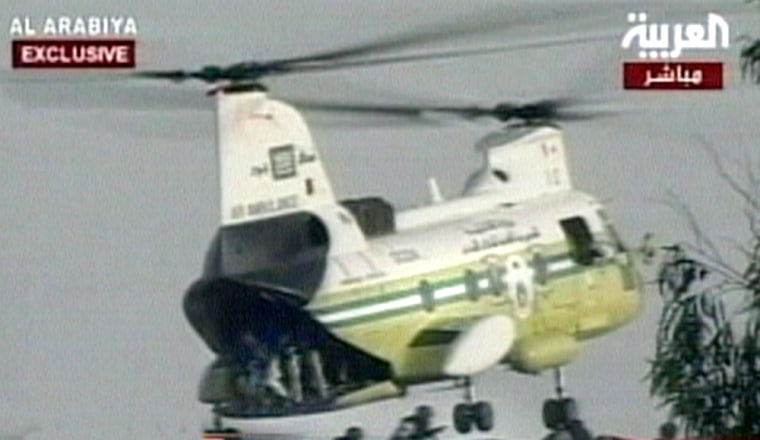Britain said Monday that more attacks were probable in Saudi Arabia, where security forces hunted suspected al-Qaida militants who killed 22 people in their second major strike in a month on the oil industry.
Attacks are “clearly possible,” Britain’s ambassador to Saudi Arabia, Sherard Cowper-Coles, told the British Broadcasting Corp. “I would go further than that and say they are probable.”
A Briton was among 19 who were foreigners killed in the attack.
“There is an active terrorist campaign [in Saudi Arabia], and we know that Westerners are targets,” said Cowper-Coles, whose country is the second-largest foreign investor in Saudi Arabia behind the United States.
King Fahd and other members of the Saudi royal family rushed to reassure the world that they remained in full control of the country, despite vows by al-Qaida, led by Saudi fugitive Osama bin Laden, to topple them.
“These criminal acts by deviants will only strengthen our resolve to fight terrorism,” the king, who is in poor health and was making a rare statement, said in his first comments on the shooting and hostage-taking rampage in the eastern oil city of Khobar.
Bush condemns attack
President Bush called Crown Prince Abdullah to condemn the attack and praised Saudi security forces for “saving many hostages,” the state Saudi Press Agency said.
But as pictures of the bloodbath were beamed around the world, Western countries urged their citizens to either leave Saudi Arabia or not to go the kingdom unless it was essential.
“There were pools of blood. Blood is everywhere,” said a member of the staff at the luxury Oasis compound, the scene of a 25-hour hostage standoff. He declined to be identified.
Saudi authorities, who dropped commandos onto a rooftop in the Oasis compound to end the standoff, set up security checkpoints across the country after three of the militants escaped by using hostages as human shields.
The attackers fled to nearby Dammam, where they abandoned their truck for a car they commandeered at gunpoint from an unidentified driver and drove off with police in pursuit, a police official said Monday. A fourth militant, described as the ringleader, was captured Sunday.
Speaking on condition of anonymity to The Associated Press, an Oasis employee who was inside the compound assessing damage Monday relayed an account from a freed hostage who was fluent in Arabic. The former hostage said security forces allowed the attackers to flee because they were killing hostages.
The former hostage said he heard a gunman say, “Let us go and we’ll let the hostages go.” Security forces first refused, but they agreed after the militants, who also threatened to blow up the building, began killing hostages, the former hostage said.
A Saudi security official, also speaking on condition of anonymity, would not directly address whether the militants were allowed to escape. But he said: “Our main priority was the hostages, and those guys who ran away, we know how to find them.”
Militants in military garb
Officials said nine hostages, including some Westerners, were killed by the militants, who were dressed in military uniforms and armed with grenades and machine guns.
The building where the hostages were held was still sealed off after the siege, but bullet holes, bloodstains, shattered glass, empty cartridges and grenades provided evidence of the havoc, said a witness, who declined to be named.
Westerners were also among those killed earlier when the militants opened fire on the Al-Khobar Petroleum Center building, which houses offices of major Western oil firms, and then swept through housing compounds.
The militants dragged the body of a dead Briton through the streets behind a car, witnesses said. The body of an American suffered the same fate in an attack on a petrochemical site in the Red Sea town of Yanbu earlier in May.
The Interior Ministry listed the dead as an American, a Briton, an Italian, a South African, a Swede, eight Indians, two Sri Lankans, three Filipinos, an Egyptian boy and three Saudis. It said 25 people were wounded.
Officials said that 41 people had been held hostage and that 201 were trapped inside the compound during the standoff.
Al-Qaida claim
An Internet statement purporting to come from al-Qaida said bin Laden’s network carried out the attack, which it said was the result of “detailed observation.”
The network’s top leader in Saudi Arabia, Abdulaziz al-Muqrin, vowed that 2004 would be “bloody and miserable” for the kingdom. Last week, he issued plans for urban guerrilla warfare.
In 1996, the then-little-known group chose Khobar for one of its first big attacks, blowing up a compound and killing 19 U.S. soldiers.
The attack in the kingdom’s oil industry hub was expected to have some effect on world oil markets, where prices have been at new highs, but analysts have said jitters should not be too strong because no hard oil facilities, such as refineries, were targeted.
Most oil markets were closed Monday, but one that was open in Tokyo indicated that traders are concerned, with crude oil futures up, Dow Jones Newswires reported. Dow Jones also reported that the attack prompted U.S. hedge funds, investment banks and speculators to sell the U.S. dollar, sending the currency to a 3½-week low of 110 yen in Asian trading.
